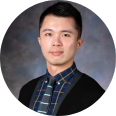Faces of FASEB
Channeling a Fascination with Genetics
 Like most of us, Marco L. Leung, PhD, didn’t know what he wanted to do when he was in high school. So somebody posed a most unusual what-do-you-want-to-be-when-you-grow-up question that got him thinking about that: What kind of TV show do you like to watch?
Like most of us, Marco L. Leung, PhD, didn’t know what he wanted to do when he was in high school. So somebody posed a most unusual what-do-you-want-to-be-when-you-grow-up question that got him thinking about that: What kind of TV show do you like to watch?
“And I'm like, 'Oh, I like those crime scene shows, CSI, the forensic science shows, something with DNA.' That's kind of how I got into it,” says Leung, who now finds himself working in the science of genes.
Nowadays, he serves as clinical director of the Steve and Cindy Rasmussen Institute for Genomic Medicine at the Nationwide Children’s Hospital and as associate director of the Columbus, Ohio, hospital’s genetics and genomics fellowship. Among additional roles, he also holds two clinical assistant professorships, one in pediatrics, the other in pathology, at Ohio State University.
“I can’t say I picked pediatrics specifically,” he says. “But since I am trained in laboratory genetics that involves testing inherited pediatric-onset diseases, I have only worked at children’s hospitals that perform genetic testing for these pediatric-onset diseases.”
His lab work also focuses on cancer, seeking to find mutations that can determine a patient’s specific tumor, thus leading to a tailored diagnosis, prognosis, and treatment options.
After high school—and realizing that TV had spurred his fascination with DNA—he went on to earn his bachelor’s degree in Molecular Genetics in 2010 and, in 2016, his doctoral degree in biomedical sciences, both at the University of Texas MD Anderson Cancer Center in Houston.
Leung, who was born in Hong Kong, moved with his family to Sugar Land, a half-hour drive from the school. He was 14 at the time.
“Growing up in a suburb in Texas, it's definitely different. I have an accent, I look different from other people, but I also think that being born somewhere else, living here, actually gives me that perspective of outside looking in,” he says. “In a way, it does help me grow more, gives me the resilience and gave me that hard-working mentality.”
Those experiences also drive his passion for diversity, equity, inclusivity, and accessibility. As a member of the Association for Molecular Pathology, which is a member society of FASEB, he currently chairs AMP’s DEI Working Group.
He sees AMP’s DEI initiatives as integral to the organization’s work to attain the highest quality healthcare in molecular genomic laboratory medicine through education, innovation, and advocacy.
“In order to do that, they have really incorporated DEI into their mission, which is very crucial for efforts to serve our members and advanced clinical care patients,” he says. “DEI would insure the long-term excellence of both the society and the field of molecular genomic laboratory medicine.
That extends to mentoring, he says.
Being different, as he puts it, inspires him to consider the differences each trainee brings. From his work in Nicholas Navin’s renowned MD Anderson lab to his 2016–2018 fellowship at the University of Chicago, he learned the value of mentorship—and tailors his approach to each trainee the same way that, say, genomics focuses on each individual.
“I realized how I learned back when I was a trainee; it's very different than how other people learn,” he says. “And I also realized that different mentees have different personalities, different ways of learning. They all have different strengths and areas for improvement.”
Likewise, he sees the lessons he learned from his mentors as having a lasting impact, especially when it comes to his own mentoring.
“I try to draw from my experience of being a mentee,” he says, “and figure out what did I like about my mentor and kind of pass it on to the next generation.”
Marco L. Leung, PhD, is a member of the Association for Molecular Pathology, a FASEB member society.